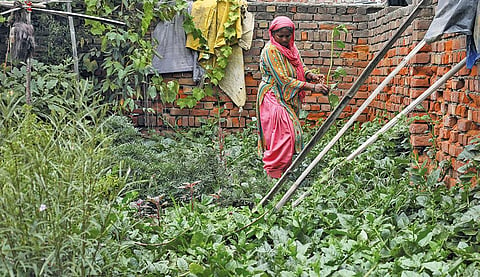

The heavy rainfall that Delhi saw this July brought unexpected benefits for Mufiza. Throughout the monsoon, Mufiza, who works as a waste picker, was able to sell 40 kg of poi saag (Malabar spinach) she had grown on a plot near her house in the Murga Mandi slum area of Bhalswa in northwest Delhi. “I have already earned about Rs 1,800 from selling saag. The crops are still flourishing,” she says.
Like her, some 620 women in the slum area spend a part of their day tending to leafy vegetables, gourds, green chillies and carrots that they have planted in pots on their rooftops and backyards. Not all of them sell the produce, but they use it for their families’ consumption.
The women took up this cultivation after a November 2021 initiative, “Kyari to Kitchen”, by Delhi-based non-profit Chintan Environmental Research and Action. The initiative was a part of the non-profit’s efforts to improve women and girls’ access to nutrition, which is often neglected. A survey that Chintan conducted in February 2022 among 5,000 women in eight slum areas of Delhi found that 79 per cent of the women reported prioritising men’s food intake. “Women and girls faced the fallout of this perception, often eating leftovers and food lacking in nutrition,” says Deepanshu Moorjani of Chintan.
In the first phase of the initiative that ended this summer, the women of Murga Mundi and surrounding slum areas received free seeds, pots and soil. “They were trained on sowing seeds and preserving them from grown crops, and on judicious use of resources like water,” says Omkar Singh, a farmer who helped in the training. The women also learnt to make agricultural inputs like manure from cow dung, which is more accessible and affordable than chemical products. “We were also given tips such as using water infused with onion and garlic shells to use as insecticides,” says Hashmina Begum, a resident of the slum
“Adapting ourselves to become vegetable growers gave us a purpose. Our families were thrilled to eat homegrown vegetables. We started to cultivate as a community and share vegetables,” says Guddi Devi, another resident and teacher.
The women, however, currently face challenges such as unpredictable rain and flow of leachate water from the Bhalswa landfill, which affects the survival of the crops. “Water is the biggest challenge, which can be addressed if the initiative is scaled up,” says Shruti Sinha, manager for policy and advocacy at Chintan, adding that this is being planned with help from the government.
This was first published in the 16-31 October, 2023 print edition of Down To Earth